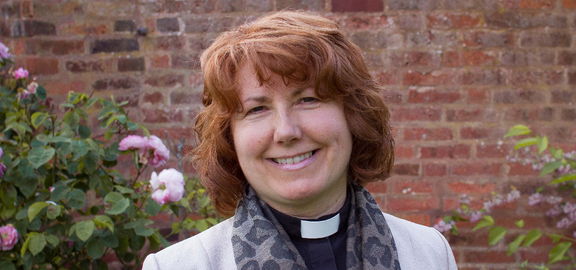It’s been a year since the Church of England allowed the consecration of bishops (and a week since the Seventh-Day Adventists voted against the ordination of women as priests). The Telegraph points out that those women who have been consecrated as bishops have all been non-controversial, and the wives of vicars or bishops themselves, and at least partly as a result of that the news of each successive bishop has been less and less noticed, perhaps for the good:
…with each new announcement the news coverage has lessened. There are new battles to fight.
Perhaps this can only be a good thing.
As Rachel Treweek, now the Bishop of Gloucester, said about her appointment in March: ‘”I hope this will become something normal. Won’t that be wonderful when, in the best sense, it isn’t newsworthy because we’re women?’
These “non-radical” bishops (including the Reverend Anne Hollinghurst, pictured above, announced July 2 as suffragan bishop of Aston in the diocese of Birmingham) have not had the opportunity to do any groundbreaking ministry yet:
…the Church has chosen not to go for a personality; someone who would rock the boat or draw too much media attention.
And there is definitely wisdom in this – there have been too many headlines about the Church’s relationship to gender issues of late. After all, the Church of England has been embroiled in controversy about women bishops for years. Three years ago there was a vote in the General Synod to appoint them but it was voted down, much to everyone’s shock. There was a massive media and public backlash and some MPs were even talking about forcing the Church to accept women to the highest offices using equal opportunity legislation.
The choice of women for the first handful of bishops, may also express something useful about the fact that the role should not fall prey to the cult of the individual.
You don’t talk about personal ambition in the Church.
Columnist Jemima Thackray writes, “All I would say is that I hope the current women bishops, don’t try and be too normal. But rather, harness their peculiarity as women to bring some much needed agitation to a Church that’s in desperate need of change.”
Recent coverage has addressed the Catholic perspectives on women’s roles in the church, including a profile in Mpls.St.Paul Magazine of women who have been ordained as Catholic priests, and, as a result, excommunicated from the church – a punishment that, according to the magazine, has not been imposed on other violators of religious, ethical or church laws, including Minnesota priests who have been accused of child abuse, and for Catholics who have committed murder. One of those priests is Josie Petermeier, a 63-year-old former nun, theology major and Boy Scout leader, who has received
the most terrible punishment the church has—excommunication. She is from now on excluded from worship with Catholics in good standing. It’s a punishment so extreme that it was deemed too harsh for the dozens of Minnesota priests who have been credibly accused by their own archdiocese of sexually abusing children. It’s also deemed too harsh of a punishment for murderers.
“Murder is a grave sin,” explains Susan Mulheron, the chancellor of canonical affairs for the Archdiocese of Saint Paul & Minneapolis, “and a person can confess that and be in communion with God. But there are certain actions that are recognized by the church as causing a detriment to the communion and unity of the church. A delict is a crime that goes beyond one person’s action and affects the whole body of the church.” Which is why murderers and pedophiles are not excommunicated, but Petermeier is.
The story profiles three women priests, including Petermeier, who lead the congregation of Compassion of Christ Catholic Community in Prospect Park, Minnesota, and explores the history of women’s roles in the Catholic Church from the 13th century to the 21st, as well as a movement among Catholic men to support the ordination of women.
In the National Catholic Reporter’s Global Sisters Report, Sr. Jeannine Gramick, co-founder of New Ways Ministry and an executive coordinator of the National Coalition of American Nuns, writes about the April meeting of 22 Catholic reform organizations in Ireland. The group discussed (among other topics including LGBT inclusiveness, inter-faith families, marginalized people and the status of women living in “poverty, oppression or violence”) women’s roles in the Catholic Church. The difficult divisions within the group became most apparent when they discussed the question of having women co-preside in the Eucharist. Gramick writes:
The conversation was extremely honest. I shared that I worship on Sundays with an intentional Eucharistic community, in which a laywoman co-presides with an ordained male priest. There are hundreds of these intentional Eucharistic communities in the U.S. and thousands more throughout the world. This summer, scores and scores of these intentional Eucharistic communities gathered for a fourth conference in St. Paul, Minnesota. For me, it seemed quite natural to have gender balance in leading the liturgy here in Limerick.
The delegates from Germany, Austria and Switzerland seemed mostly to share my view but, as we went around the circle, it was obvious that not all did. Some ordained priests were extremely anxious about ecclesiastical censure. One priest said, quite honestly, how much he loved his priestly ministry; he feared being reckless, and he also feared being a coward.
In the end, the group held a prayer service but did not share bread and wine. A letter was drafted to Pope Francis calling for the revitalization of the Catholic church and speaking against the merging of smaller parishes into larger ones, where one-on-one ministry becomes diminished: “We agreed to urge Pope Francis to clear the way for new models of ministry and management in parish life by calling for ‘a new culture of co-responsibility and joint decision-making in all structures of our Church.'”
Posted by Cara Ellen Modisett

